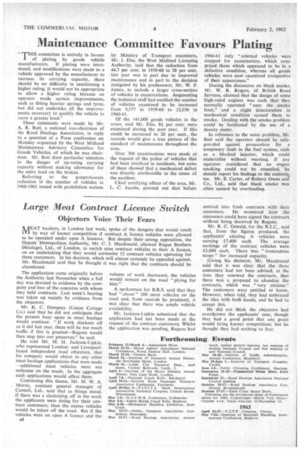Large Meat Contract Licence Switch
Page 42

If you've noticed an error in this article please click here to report it so we can fix it.
Objectors Voice Their Fears
IUTEAT hauliers, in London last week, spoke of the dangers that would result al by way of keener competition if contract A licence vehicles were allowed to be operated under open A licences. But despite their strong opposition, the Deputy Metropolitan Authority, Mr. C. J. Macdonald, allowed Regan Brothers (Haulage), Ltd., of London, to switch nine contract vehicles to their A licence, on an undertaking that they would surrender 12 contract vehicles operating for three customers. In his decision, which will almost certainly be appealed against, Mr. Macdonald said that he thought it was right that the contracts should be abandoned.
The application came originally before the Authority last November when a full day was devoted to evidence by the company and two of the concerns with whom they held contracts. Last week's hearing was taken up mainly by evidence from the objectors.
Mr. K. C. Dempsey (Union Cartage Co.) said that he did not anticipate that the present busy spate in meat haulage would continue. "If work slackens off as it did last year, there will be too much traffic if this is granted—Regans would then step into our preserves," he said.
He told Mr. M. H. Jackson-Lipkin, who represented Londonand Liverpoolbased independent road objectors, that his company would object to any other meat haulage applications that were made —additional meat vehicles were not welcome on the roads. In the aggregate such applications would affect them.
Continuing this theme, Mr. M. W. A. Morris, assistant general manager of Cornell, Ltd., said that as things stood, if there was a slackening off in the work the applicants were doing for their contract customers, then the excess vehicles would be taken off the road. But if the vehicles were on open A licence and the B8 volume of work decreased, the vehicles would remain on the road "plying for hire."
A spokesman for B.R.S. said that they had " about " 200 meat vehicles on the road and, from records he produced, it was clear that there was ample vehicle availability.
Mr. Jackson-Lipkin submitted that the application had not been made at the request of the contract customers. Whilst the application was pending, Regans had entered into fresh contracts with their customers. He wondered how the customers could have signed the contracts without being deceived by Regans.
Mr. R. C. Oswald, for the B.T.C., said that, from the figures produced, the applicants' existing A vehicles Were earning 0,400 each. The average earnings of the contract vehicles were 0,600 each. There was "tremendous scope" for increased capacity.
• Giving his decision, Mr. Macdonald said that it was clear that the three customers had not been advised, at the time they renewed the contracts, that there was a proposal to abandon the contracts, which was "very curious." The customers were entitled to know. However, when told, they had embraced the idea with both hands, and he had to accept this, He did not think the objectors had overthrown the applicants' case, though they had a good point that any grant would bring keener competition; but he thought they had nothing to fear.




























































































































